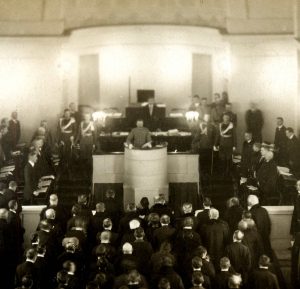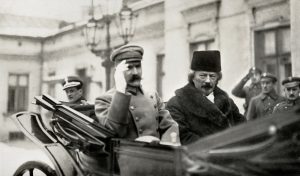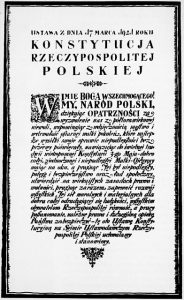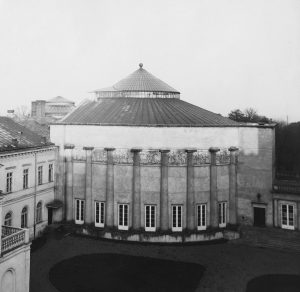At the point in time when Józef Piłsudski arrived in Warsaw there were a number of power bases in the country, but none of them was in a position to actually govern the whole of Poland. For some this was due to their regional character (eg the Polish Liquidation Committee in Galicia) and for others due to their limited social base (eg the Regency Council, the Provisional People’s Government in Lublin).

Only Piłsudski had the necessary authority, social backing and vision of a Polish state to take over the reins of power which, figuratively speaking, were lying in the street for the taking. Both the unpopular, conservative Regency Council and the left-wing Provisional People’s Government submitted to his authority and then disbanded. On 14 November 1918 Piłsudski made a declaration addressing the fundamental issue of the Polish state’s system of government: Poland was to be a parliamentary republic. In the declaration he also announced that a legislative assembly would be convened as soon as possible. At the same time he appointed a left-wing (but not revolutionary) government whose task was to run the country, make preparations for the elections and introduce the most pressing social reforms.
On 22 November 1918 the government issued a decree approved by Piłsudski concerning the highest ranking office of state of the Polish Republic. It confirmed the assertion that Poland was a republic and proclaimed that until the legislative assembly was convened the highest authority in the country would be exercised by the Interim Head of State — an office filled by Józef Piłsudski. The use of the Polish word Naczelnik (which can mean “head” or “commander”) in the title of the position was a reference to Tadeusz Kościuszko’s designation at the time of the 1794 uprising ie Commander of the National Armed Forces. Piłsudski was given the right to appoint a government which would report to him. For the time being legislative power was to be exercised by the government by means of decrees authorised by the Head of State. Thus Piłsudski was granted very wide powers indeed.

The rules governing the elections to the legislative assembly were announced promptly on 28 November 1918. For the first time women were to participate in the elections. The date for the elections to the single-chamber legislative assembly was set for 26 January 1919. ‘Any politician protesting and trying to persuade Piłsudski that only the view they represented truly expressed the will of the people heard Piłsudski’s one and only reply… “The elections will show whether your claim is justified.” …Piłsudski saw anyone wanting to speak to him, he would talk to everyone,’ recalled Aleksandra Piłsudska.
On 10 February 1919 Józef Piłsudski opened the first session of the legislative assembly and made a speech setting out his policies, including the principles underlying Polish foreign policy. At the third session of the legislative assembly on 20 February Piłsudski resigned from the office of Interim Head of State and in response the parliament expressed its thanks for his work in office and entrusted to him the office of Head of State for the period until a constitution was enacted. This reduced Piłsudski’s power which was now governed by the newly enacted Small Constitution which defined the scope of the powers of both the legislative assembly and the Head of State. At the same time as it passed the Small Constitution the parliament unanimously expressed its thanks to Piłsudski in a special resolution, ‘for taking great pains in carrying out the duties of his office and so serving the Fatherland’. Józef Piłsudski remained in post as Head of State until December 1922 when he passed on the powers he held as head of state to the elected President of the Polish Republic Gabriel Narutowicz.



